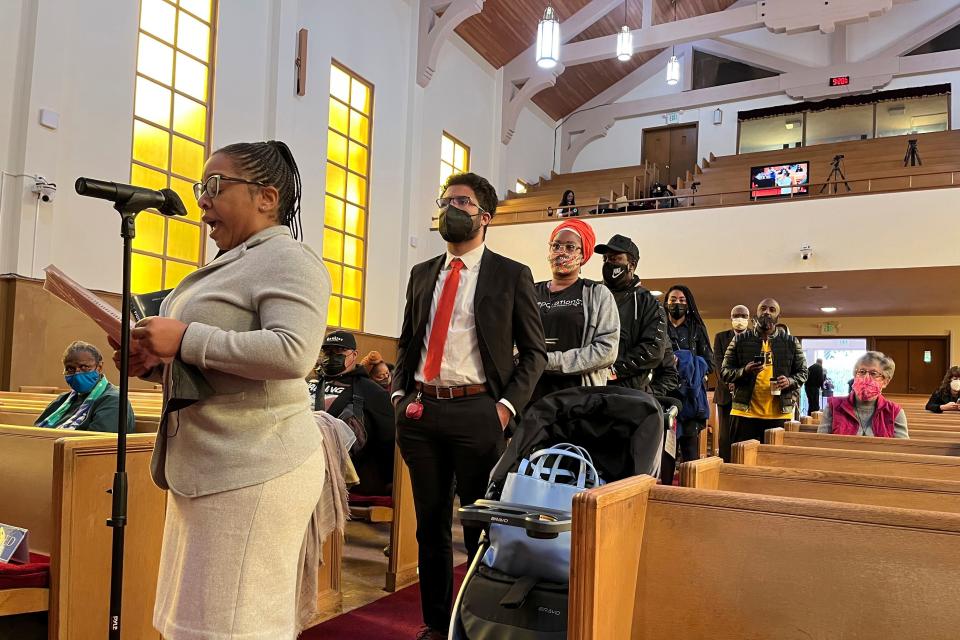'Long overdue:' California reparations bill would give some Black residents compensation
Members of the California Reparations Task Force are set to vote this weekend on a plan detailing recommendations for state compensation of eligible African Americans for financial losses brought on by slavery and decades of institutional racism.
If passed, the group would submit final recommendations by June 30 to the California State Legislature, where lawmakers would decide whether to follow through with reparations and whether to accept or modify the methodology proposed by the task force.
“This is necessary because it’s long overdue from a state and federal level,” said Jovan Scott Lewis, associate professor at the University of California, Berkeley. “Despite the progress that the country and state continue to make in various ways, we continue to see African Americans not benefitting from this progress.”
The task force is set to meet Saturday at Mills College in Oakland, California, as it nears the culmination of two years of work.
How are potential reparations calculated?
Earlier this week, the group issued more details, including potential payout estimates calculated by economist advisers who considered areas of harm affecting the state’s Black community and their resulting economic losses. Each was assessed over particular time frames “since different laws and policies inflicted measurable injury across different periods,” the documents state.
The five areas of harm cited for consideration include health care inequities, housing discrimination, mass incarceration and over-policing of African Americans, unjust taking of property by eminent domain and devaluation of African American businesses.

Lewis, a member of the task force, said those areas extend beyond slavery itself, precluding arguments that California should not be responsible for reparations having not been a slave state.
According to the documents, “the state’s participation in the discriminatory denial of equal healthcare, unjust property takings and devaluation of African American businesses began with the founding of the State in 1850 and has continued to this day.”
As proposed by the task force, residents who can show descendancy from enslaved persons and eligibility under each category could be entitled to certain amounts. For example, a Black resident who is 71 years old – the average life expectancy for the California’s Black population – and had lived in the state their entire life could be eligible for about $1.2 million.
“The task force is recommending a methodology, not a particular dollar amount,” Lewis said. “That’s not our responsibility. The state Legislature will have to decide whether or not they want to provide compensation to the community based on the losses we have calculated.”
A similar process was used in determination of reparations to eligible Japanese Americans affected by the injustices of World War II relocation and internment. Eligible surviving recipients received $20,000 and an apology from then-President Ronald Reagan.
How did these efforts come about?
The task force was created as a result of California Assembly Bill 3121, charged with showing “incontrovertible evidence of the harms requiring reparations” and making recommendations for redressing those harms. The idea gained traction as the nation experienced a collective period of reconciliation after the murder of George Floyd by a Minneapolis police officer in May 2020, Lewis said.
“The African American story in the United States is marked by repeated failed promises to right the wrongs of the past – both distant and recent – and failure to acknowledge and take responsibility for the structural racism that perpetuated these harms,” the task force said as part of a chapter, among 500-plus pages of supporting documents, outlining the history and long-term harms of slavery and its role in building American wealth.

According to the documents, the atrocities and harms “purposefully and collectively visited upon African Americans” represent violations of international humanitarian law that warrant reparations.”
“Academics acknowledge that the cultural destruction, social death, and subjugation of African Americans has resulted in the equivalent of a cultural and social genocide,” they read.
What's the next step?
Should the Legislature pursue reparations, the task force recommends kicking off the payout process with “down payments” representing “a meaningful amount of funds” to eligible recipients. It could also recommend the state issue a formal apology for its role in enforcing the federal fugitive slave law, construction of Confederate monuments, interracial marriage bans and segregation.
According to CalMatters, implementation would require formation of a new state agency to oversee fund distribution and eligibility determination, including helping residents to trace their lineage.
Some expect the plan to meet opposition from Republican and moderate Democrat legislators.
Lewis said what the task force set out to do from the start “was to respond to the breadth of harms that this community has experienced. This is a reasonable and responsible set of recommendations, and ultimately it will be up to the state, and the California public, to decide what to do.”
Dig deeper:
Pessimism: Most Black people believe in reparations but are pessimistic about chances
California Reparations Task Force: California reparations for Black people could shape federal debate
The fight for African American studies in schools isn't getting easier: Even after 50 years
This article originally appeared on USA TODAY: California reparations group wants some Black residents to get paid

